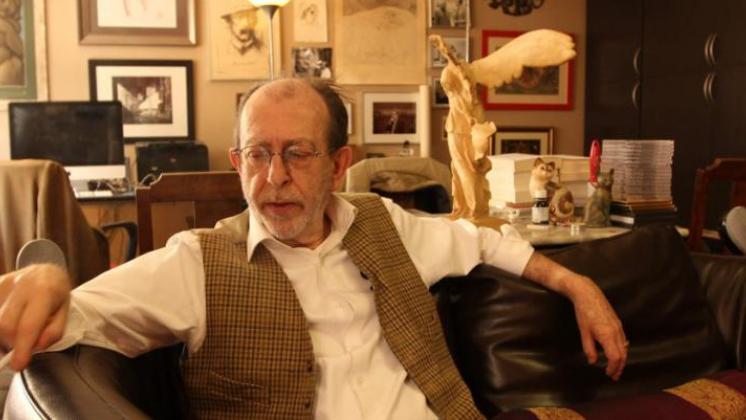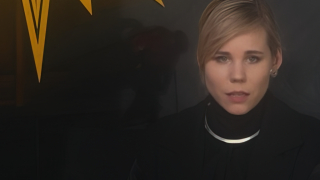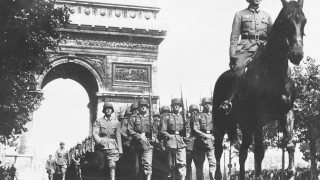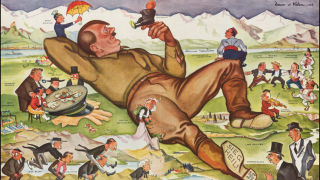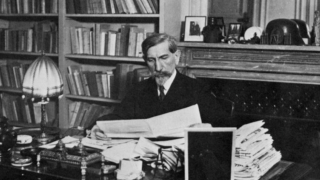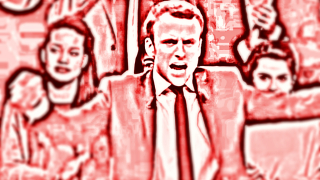Alain de Benoist: Macron was underestimated by many, by myself firstly
For the last few weeks, political events have followed each other in France, and the principal event among them remains quite obviously the election of Emmanuel Macron to the presidency of the Republic.
A few weeks before the legislative elections, Alain de Benoist, who also just released a book ( “Ce que penser veut dire” with éditions Pierre Guillaume de Roux), addressed Emmanuel Macron's arrival in power, the state of the opposition, notably the Front National, and the big stakes to come.
Breizh-info.com :Emmanuel Macron has become the president of the Republic? How does that make you feel?
Alain de Benoist: Firstly regrets. Then some astonishment. Never elected in the past, still unknown a few years ago, Emmanuel Macron won his bet. That alone cannot be explained by the extent of the support from which he benefited. To be propelled to the head of state without being the candidate of a traditional party, to pass from obscurity to the spotlight in two or three years, that is something never seen before. That shows the extent of today's crisis, and also gives his election a historic character.
Of course it can be argued that Macron was only elected by default, that he was elected with the support of only 43.6% of registered voters, that a good third of the French people (33.7%) shunned the choice offered to them, either by taking refuge in abstention or voting blank or null in proportions not seen since 1969, and finally nearly half of those who voted for him only did so in order to “block” Marine Le Pen. But all that will be quickly forgotten. Even when one is elected badly, one is elected.
I will add that the first acts of the Macron presidency, even if they don't truly indicate what his policy will be, at least suggest that his personality has been underestimated by many, by myself firstly. I do not doubt for an instant that the policy of social breakdown, lower salaries, and open borders that will very likely be implemented by the grand coalition of liberals across the board will be a catastrophe for our country.
But for the moment, Macron does not appear as the fabricated marionette that we imagined him to be. Not only is he not a “Holland round two”, as the most obtuse folks on the right say, but he will be an anti-Hollande in many respects. This ultraliberal is doubtlessly also an authoritarian, convinced of the necessity of restoring solemnity to the presidential institution. The key words of his speech were “at the same time!”
Breizh-info.com : What do you think of the government's composition? Do you see, as I said recently in an open forum, a stroke of genius there by Emmanuel Macron in order to kill the right, break the FN, and only end up with a strong extreme left opposition in the streets against him?
Alain de Benoist: One expected a government of “start-uppers,” reflecting a post-political conception of public life. Yet, that has not been the case. Your analysis is not wrong, but one must add that Macron is only exploiting a situation he didn't create to his advantage.
Besides his “youthful” optimism, his success is explained by the conjunction of two factors: the general desire to see the old political class “disappear” and the fact that for 75% of French people, the notions of right and left “no longer mean very much.” (Cevipof poll, March 2017).
In fact Emmanuel Macron pursued a very simply objective: break, drain, reduce, or cause the disappearance of anything still found in the political space separating la République en marche from la France insoumise on one hand and from the Front National on the other. A few years ago we saw a new tri- partition FN-UMP-PS replace the old French bi-partition.
This new tri- partition was superseded on the night of the first round of the presidential election by a quadri- partite form: FN- Républicains-France insoumise-En marche! By seeking to attract the “right” of Parti Socialiste and the “left” of les Républicains towards him, Emmanuel Macron sought to recreate a different tri- partition from preceding one: FN - République en marche - France insoumise. Then the coalition of liberals would only have to the deal with the conjunction of “extremes.”
At once we note that this objective, capable of making the Cambadélis and Baroins despair, is not very different, on the other hand, from what Marine Le Pen and especially Jean-Luc Mélenchon may desire.
Breizh-info.com : Despite her eleven million votes in the second round, Marine Le Pen disappointed the majority of her supporters. According to you, what are the causes of what we must necessarily call her failure? Do you also think that she spoke too much of the economy and social issues, that she was not sufficiently concentrated on right wing voters, who would constitute her most natural reserve of votes?
Alain de Benoist: On the eve of the second round, Marine Le Pen was credited at least 40% of the vote. She only received 34%. This mediocre performance cannot be explained solely by the quasi-unanimous support of the media and financial powers for Macron's candidacy. Nor can it be explained by an alleged failure of “de-demonization.”
In 2002, when Jean-Marie Le Pen qualified for the second round, three million people marched and demonstrated in the streets, though the president of the FN had no chance of winning.
This time, there were only a few gangs of thugs and antifa going to agitate in the street.
As Pierre-André Taguieff very rightly said, “the anti-nationalism demonizing [the FN], the offspring of anti-fascism and anti-racism, has largely lost its mobilizing force.” Clearly: it doesn't work anymore.
If Marine Le Pen wasn't capable of turning the trend in her favor, while a veritable thoroughfare opened before her, it's quite simply because her campaign wasn't good.
We can certainly invoke the themes she chose to emphasize. Like many, I actually think that she was wrong to put economic arguments ahead, and not underline the civilizational stakes of this election. Her obsession with leaving the euro had deleterious effects because, even supposing that such an objective is justified, it is evident that the complexity of the subject prevented it from being a campaign theme, especially since a vast majority of French people are totally opposed.
On the contrary, I believe that she didn't emphasize the social aspect enough which is, with immigration and insecurity, one of major preoccupations of the popular classes in an era where the capitalist system is in the process of destroying the world on a scale never seen before. In contrast to hyper-mobile nomads, the sedentary people have not yet been converted to globalization!
But that's not the main thing. The most serious thing is that Marine Le Pen's candidacy clearly revealed her own shortcomings. Her campaign never hit the right note. She lacked style, emotion, lyricism, vibrato. She knew how to speak, she didn't know how to debate.
She knew how to elicit applause, but not excite crowds. In the disastrous debate against Macron, she revealed herself to be both incompetent and uselessly aggressive, thus suggesting that she was not at the level of her ambitions.
Marine Le Pen had the great merit of transforming a pure protest movement into a party truly desirous of coming to power, but in order to come to power you need to have the capacities for it. Pretending to speak in the name of the people doesn't even suffice for knowing how to speak to the people.
Breizh-info.com : What prospects for political re-composition do you see emerging?
Alain de Benoist: In reality re-composition is an explosion that has already reached all political milieus. For the two old “big” parties who were the carriers of the left-right divide, the socialists and les Républicains, we must speak of decomposition, not re-composition. The PS is in agony, and Mélenchon doesn't hide his desire to replace it.
The Former UMP, on the other hand, has long represented an unnatural alliance of the conservative right and the Bonapartist right, the Orleanist right and the liberal center. The thunder strike of the presidential election freed among the right some centrifugal forces that will have the greatest difficulty reconciling themselves with each other. We see it more clearly each day: these parties belong to another era. And we can also ask if its going to be the same for the very party-form that we've known.
Can there be a re-composition on the right? That's what the proponents of the “right outside the walls” [Translator's note: those on the right who do not belong to any major party] desire by calling for for a “right wing union” since long ago, an old objective never realized. The “buissonnière” [Translator's note: referring to Patrick Buisson, a conservative journalist and historian] strategy, which advocates the alliance of populism and conservatism, the popular and middle classes, has a certain validity.
Nevertheless it stumbles on a certain blind spot: what conservatism are they speaking of? With liberal conservatism, there is nothing to do in my opinion, because it's an oxymoron: liberalism, which is primarily capitalism, individualism, and no-borders universalism, rests on foundations that would necessarily lead to the destruction of everything conservatives want to conserve. Migratory floods are only a consequence (and an aspect) of the logic of profit. One cannot mobilize the popular classes to defend the interests of the powerful.
On the other hand, the populist dynamic is called to endure, for the excellent reason that it is rooted in today's sociology. The populist divide now crosses all political tendencies. The present situation isn't sustainable. If the popular classes, who are no longer represented politically, culturally, and intellectually because they have been marginalized by the oligarchy, are also concerned about identity, it's because they possess nothing but this immaterial patrimony.
Breizh-info.com : Is the Front National going to end up imploding? Would it be a blessing in disguise?
Alain de Benoist : The Front National isn't reformable, and no one can claim to replace Marine Le Pen. Marion was right to leave political life. Starting from there, we can envision: doubtlessly turbulence, progressive ossification, maybe splits. Disappointment always causes the same effects. Florian Philippot, who is the bête noire of both right wing extremists, Catholics, and liberals, will certainly face accusations. But we can imagine other scenarios.
Would the implosion of the FN be a blessing in disguise? I don't have an answer to that question, because I don't see the beginnings of what could replace it.
If it means creating another, more radical movement, but one that would abandon any criticism of liberal capitalism and no longer express a particular conception of the world, henceforth only speaking of identity and immigration, I'm not interested in it.
It will always be impossible to seduce those who want to defend their portfolios first, because, whatever their feelings on immigration, they find themselves very well positioned in the abject merchant society we live in. On the other hand, it is very clear that a number of the FN's very contestable orientations should be modified or abandoned, but the party apparatus has neither the desire nor the means to question itself.
Breizh-info.com : We just commemorated the death of Dominique Venner. What legacy does he leave today?
Alain de Benoist : He leaves the example of a lifestyle, ethical behavior, and a fidelity to himself that he would embody even in death. He was not a compromising man (his hostility to Christian values wasn't hidden behind the equivocation of “pagano-Christianity”). We also owe a series of history books to him, many of which will remain reference works.
People should read them rather than excite themselves about his youthful writings, in which Dominique Venner no longer recognized himself – especially since at the end of his life, he was convinced more than ever of the uselessness of political action.
Breizh-info.com : You just released a new book entitled “Ce que penser veut dire.” Can you tell us about it?
Alain de Benoist : I will give a simple answer: it's a collection of texts that focus on presenting the life and work of a certain number of great thinkers, from Rousseau, Goethe, Nietzsche, and Karl Marx until Jean Baudrillard, Julien Freund, Michel Villey and Jean-Claude Michéa, through Carl Schmitt, Heidegger, Leo Strauss, Hannah Arendt and many others.
Such figures have taught us how to think – not to think about something, but to think directly: the nature of man and the functioning of society, the essence of politics and law, the meaning of war, relations between nature and culture, the role of technology, mercantile alienation, etc. To think means to go to the essential. Here we are very far away from everyday politics!
Interviewer: Yann Vallerie
Translated by Eugene Monsalvat

